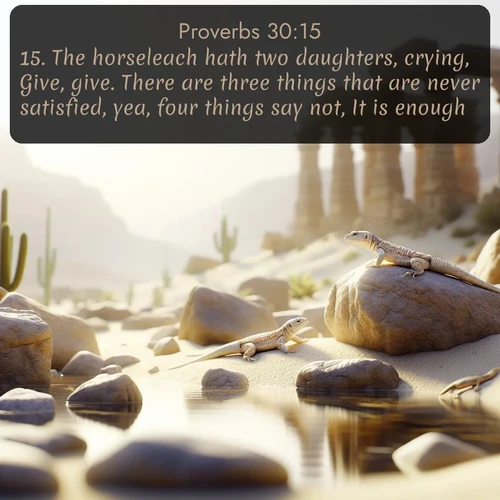Proverbs 30:15 plusieurs versions / traductions
English Bible Translations
15. The horseleach hath two daughters, crying, Give, give. There are three things that are never satisfied, yea, four things say not, It is enough:
15. The horseleach hath two daughters, [crying], Give, give. There are three things that are never satisfied, [Yea], four that say not, Enough:
15. The night-spirit has two daughters, Give, give. There are three things which are never full, even four which never say, Enough:
15. The leech hath two daughters: Give, give. There are three [things] never satisfied; four which say not, It is enough:
15. The horse-leech hath two daughters, crying, Give, give. There are three things that are never satisfied, yes, four things say not, It is enough:
15. To the leech [are] two daughters, `Give, give, Lo, three things are not satisfied, Four have not said `Sufficiency;'
German Bible Translations
15. Blutegel hat zwei Töchter: Bring her, bring her! Drei Dinge sind nicht zu sättigen, und das vierte spricht nicht: Es ist genug:
15. Der Blutegel hat zwei Töchter: «Gib her, gib her!» Drei Dinge werden nimmer satt, vier sagen nie: «Es ist genug!»:
French Bible Translations
15. La sangsue a deux filles: «Donne! Donne!» Trois choses sont insatiables, quatre ne disent jamais «Assez»:
15. La sangsue a deux filles: Donne! donne!Trois choses sont insatiables,Quatre ne disent jamais: Assez!
15. La sangsue a deux filles: Donne! donne! Trois choses sont insatiables, Quatre ne disent jamais: Assez!
15. La sangsue a deux filles: Donne! donne! Il y a trois choses qui sont insatiables, quatre qui ne disent pas: C'est assez!...
15. La sangsue a deux filles, [qui disent] : Apporte, apporte. Il y a trois choses qui ne se rassasient point; il y en a même quatre qui ne disent point; C'est assez :
15. La sangsue a deux filles, qui disent: Apporte, apporte! Il y a trois choses qui ne se rassasient point; il y en a même quatre qui ne disent point: C'est assez!
Versions with Strong Codes
Proverbs 30 / KJV_Strong15.
Strong Code definitions
H5936 `aluwqah al-oo-kaw' feminine passive participle of an unused root meaning to suck; the leech:--horse-leech.
H8147 shnayim shen-ah'-yim dual of H8145; feminine shttayim {shet-tah'-yim}; two; also twelfth, + twelve, + twenty (sixscore) thousand, twice, two. see H8145
H1323 bath bath from H1129 (as feminine of H1121); a daughter (used in the same wide sense as other terms of relationship, literally and figuratively):--apple (of the eye), branch, company, daughter, X first, X old, + owl, town, village.see H1129 see H1121
H3051 yahab yaw-hab' a primitive root; to give (whether literal or figurative); generally, to put; imperatively (reflexive) come:--ascribe, bring, come on, give, go, set, take.
H3051 yahab yaw-hab' a primitive root; to give (whether literal or figurative); generally, to put; imperatively (reflexive) come:--ascribe, bring, come on, give, go, set, take.
H7969 shalowsh shaw-loshe' or shalosh {shaw-loshe'}; masculine shlowshah {shel-o-shaw'}; or shloshah {shel-o-shaw'}; a primitive number; three; occasionally (ordinal) third, or (multipl.) thrice:--+ fork,+ often(-times), third, thir(-teen, -teenth), three, + thrice. Compare 7991.see H7991
H2007 hennah hane'-naw prolongation for H2004; themselves (often used emphatic for the copula, also in indirect relation):--X in, X such (and such things), their, (into) them, thence, therein, these, they (had), on this side, whose, wherein.see H2004
H3808 lo' lo or lowi {lo}; or loh (Deut. 3:11) {lo}; a primitive particle; not (the simple or abs. negation); by implication, no; often used with other particles (as follows):--X before, + or else, ere, + except, ig(-norant), much, less, nay, neither, never, no((-ne), -r, (-thing)), (X as though...,(can-), for) not (out of), of nought, otherwise, out of, + surely, + as truly as, + of a truth, + verily, for want, + whether, without.
H7646 saba` saw-bah' or sabeay {saw-bay'-ah}; a primitive root; to sate, i.e. fill to satisfaction (literally or figuratively):--have enough, fill (full, self, with), be (to the) full (of), have plentyof, be satiate, satisfy (with), suffice, be weary of.
H702 'arba` ar-bah' masculine oarbaah {ar-baw-aw'}; from H7251; four:--four. see H7251
H559 'amar aw-mar' a primitive root; to say (used with greatlatitude):--answer, appoint, avouch, bid, boast self, call, certify, challenge, charge, + (at the, give) command(-ment), commune, consider, declare, demand, X desire, determine, X expressly, X indeed, X intend, name, X plainly, promise, publish, report, require, say, speak (against, of), X still, X suppose, talk, tell, term, X that is, X think, use (speech), utter, X verily, X yet.
H3808 lo' lo or lowi {lo}; or loh (Deut. 3:11) {lo}; a primitive particle; not (the simple or abs. negation); by implication, no; often used with other particles (as follows):--X before, + or else, ere, + except, ig(-norant), much, less, nay, neither, never, no((-ne), -r, (-thing)), (X as though...,(can-), for) not (out of), of nought, otherwise, out of, + surely, + as truly as, + of a truth, + verily, for want, + whether, without.
H1952 hown hone from the same as H1951 in the sense of H202; wealth; by implication, enough:--enough, + for nought, riches, substance, wealth.see H1951 see H202
Prédications qui analysent les thèmes Proverbes 30
Thèmes : Les paroles d'Agur; Le pouvoir de la sagesseRelated Sermons discussing Proverbs 30
Themes : Les paroles d'Agur; Le pouvoir de la sagessesee also: Bible Key Verses ; KJV Bible Images, BBE Bible images

